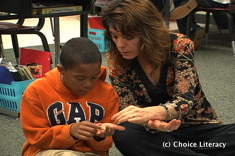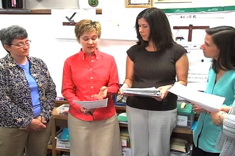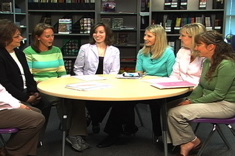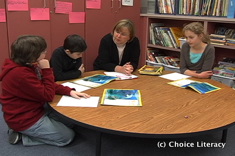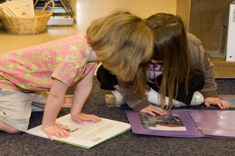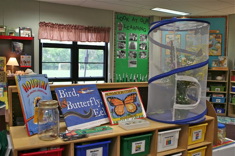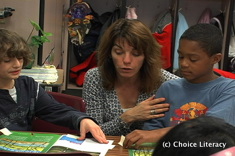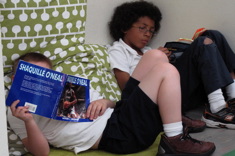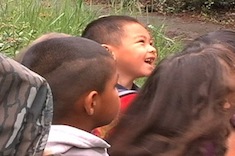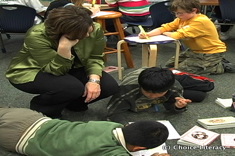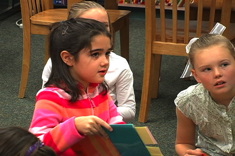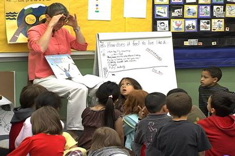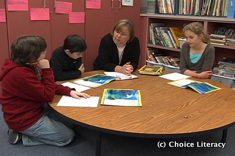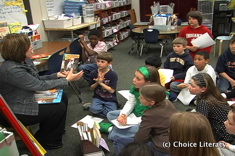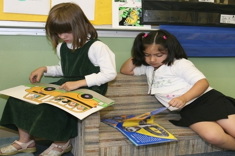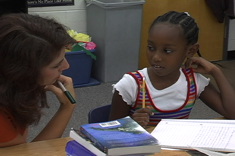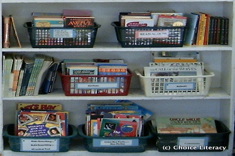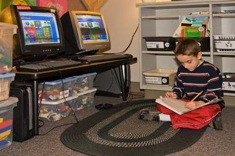Library
Choice Literacy Articles & Videos
The Choice Literacy library contains over 3,000 articles and 900 videos from 150+ contributors. Classic Classroom and Literacy Leadership subscribers have access to the entire library. Content is updated continuously, with five to six new features published each week.
Latest Content
Returning to Our Creation Chambers: Supporting Experienced Teachers
Jennifer Allen reflects on her experiences as a teacher, and develops ways to help the veteran teachers she works with return to their “creation chambers.”
The Power of Wonder Questions
Andrea Smith writes about how she uses wonder questions in her science curiculum.
Creating Shared Learning Experiences for New and Veteran Teachers
Laughter or struggles – the experiences we share are the ones that bind us together. Jennifer Allen mulls over how to foster more of those shared experiences for the colleagues she coaches.
Tips for More Effective Debriefing Sessions
Clare Landrigan and Tammy Mulligan share strategies and seven different observation templates for participants to download and try out.
Teaching Reading Skills with Wordless Picture Books
Franki Sibberson shares some of her favorite wordless picture books for teaching reading skills.
If We Could Meet Again
Shirl McPhillips captures perfectly the "shaking off the old classroom skin" feel of the start of the summer. Shirley's commentary encourages teachers to use time away from students "to break out, free up, go someplace, and cast off the trappings."
Creating a Culture of Literacy
How do we create schools and communities where everyone is passionate about reading and writing? Shari Frost has practical advice for teachers and school leaders.
Overcoming Slumps: Principles for Student Writers
Clare Landrigan finds she is struggling as a writer and runner. Getting out of both ruts helps her develop three simple principles for working with students in slumps.
From Page to Screen: My Top Ten Film Adaptations of Children’s Books
Shari Frost is inspired to create a list of her favorite children’s book to film adaptations.
Unlucky Lists: Raising Non-Writers and Non-Artists
These lists created by S. Rebecca Leigh are a fun way to size up the messages we send students about reading, writing, and drawing, and how these may influence lifelong literacy habits.
Planning to Teach with Mentor Texts: Two Examples
Once you’ve found a text you love, how do you plan lessons from it? Karen Terlecky takes teachers through the process of selecting and designing instruction with two favorite texts.
Where Am I?: The Power of Wordless Photo Books for Preschoolers
Melissa Kolb shares the power of wordless photo books with preschoolers, explaining how they work in her classroom and demonstrating with a video.
Our Daily Question: Building a Community Through the Data We Collect
If you’re looking for routines that meld community building and learning essential skills, you might enjoy Andrea Smith’s “Our Daily Question” activity with her 3rd and 4th grade students. Classmates share interests and build data gathering and analysis skills together.
Writing Like a Scientist: Launching a Scientist’s Notebook
Andrea Smith explains how she launches a unit on science writing with logs, writing samples from scientists, and mentor texts.
Biographies Off the Beaten Path
Here are some quirky biographies that will inspire and delight your students.
Making a Difference: Examples from Children’s Literature (BOOKLIST)
Spring is a time in many schools for volunteer work and community service projects. This booklist will inspire your students.
Mentor Texts for Word Choice (BOOKLIST)
Choosing words in writing is a key to effectively communicating ideas. Franki Sibberson finds that the best way to introduce and extend conversations about words is through the use of picture books.
Challenging Advanced Young Readers: Harder Texts Aren’t Always the Answer
Clare Landrigan and Tammy Mulligan discuss the concept of “challenge” in considering what texts are the best fit for advanced young readers who might be able to decode any text but don’t yet have the experiences needed to tackle sophisticated concepts.
Books for Strategy Studies
Andie Cunningham has some thoughtful recommendations for books to use in strategy studies.
Great Books to Share When Studying the Ecosystem (BOOKLIST)
Karen Terlecky shares books for studying the ecosystem in our this booklist.
Character Study in Grades 3-6
A character study unit is a terrific choice early in the school year, since it taps into students' reading histories and favorites from years past. Franki Sibberson has suggestions of books and questions for use in read-alouds.
Using Mentor Texts in Study Groups: Play and Practice
Jennifer Allen considers ways to be more practical and playful in introducing mentor texts during study groups with colleagues.
“What I Know Now” Workshop Activity
This icebreaker from Cindy Hatt is a terrific exercise for a staff or grade-level team meeting to bring together teachers and literacy specialists this time of year. It combines individual reflection with whole-group brainstorming and goal setting.
Choosing New Books for Comprehension Strategy Studies with Young Children
Ruth Shagoury and Andie Cunningham share a wealth of books appropriate for comprehension study with young children. The booklist is especially useful for work with English language learners.
When Do I Launch the Writer’s Notebook?
When and how should you launch writers' notebooks in your classroom? According to Aimee Bucker, it depends on if you are a "wader" or a "diver." She shares some of the ways she has slowly and quickly moved students into their notebooks in years past.
A Coach’s Perspective: No More Flying Pig Prompts
Heather Rader has advice for literacy coaches dealing with teachers who rely too much on writing prompts.
Out of the Closet and into the Classroom: Bookroom Management Tips for Literacy Coaches
Is your system for sharing books from a school bookroom or literacy closet working well? Shari Frost provides 10 practical tips for getting the best use out of shared literacy resources.
Addicted to Twitter: How Did It Happen?
Franki Sibberson documents the stages of tweetage, from avoidance to addiction.
The Reading Skills We Use When Searching the Internet
Browsing and previewing skills change when the medium is the Internet. Franki Sibberson has advice for working with tech-savvy young readers.
Books That Invite Conversations About Perspective (BOOKLIST)
Students need to understand perspective (or point of view) if they want to comprehend what motivates a character. In this booklist, Franki Sibberson highlights some terrific children's literature for helping students grasp the concept of perspective.
Browse Content By
Type
Category
- Assessment Tools
- Big Fresh Archives
- Booklists
- Choice Numeracy
- Classroom Design
- Common Core
- Community Building
- Conferring
- Content Literacy
- Digital Literacy
- English Language Learners
- Equity
- Family Relations
- Free Samples
- Guiding Groups
- Leadership
- Literacy Coaches
- Mentor Texts
- Minilessons
- New Teacher Mentors
- Podcasts
- Poetry
- Quote Collections
- Reading Strategies
- Self Care
- Struggling and Striving Learners
- Talking and Listening
- Teacher Study Groups
- Teaching Reading
- Teaching Writing
- Word Study and Vocabulary
Author
- Melissa Quimby
- Nawal Qarooni
- Gwen Blumberg
- Julie Cox
- The Lead Learners
- Hannah Tills
- Josie Stewart
- Ruth Metcalfe
- Mallory Messenger
- Becca Burk
- Jodie Bailey
- Vivian Chen
- Mary Brower
- Tiffany Abbott Fuller
- Stephanie Affinito
- Ruth Ayres
- Leigh Anne Eck
- Heather Fisher
- Shari Frost
- Julie Johnson
- Suzy Kaback
- Gigi McAllister
- Shirl McPhillips
- Melanie Meehan
- Cathy Mere
- Debbie Miller
- Tara Barnett and Kate Mills
- Tammy Mulligan
- Dana Murphy
- Bitsy Parks
- David Pittman
- Brenda Power
- Heather Rader
- Matt Renwick
- Mandy Robek
- Christy Rush-Levine
- Gretchen Schroeder
- Jen Schwanke
- Brian Sepe
- Katherine Sokolowski
- Stella Villalba
- Jennifer Vincent
Grade Level
Choice Literacy Membership
Articles
Get full access to all Choice Literacy article content
Videos
Get full access to all Choice Literacy video content
Courses
Access Choice Literacy course curriculum and training


